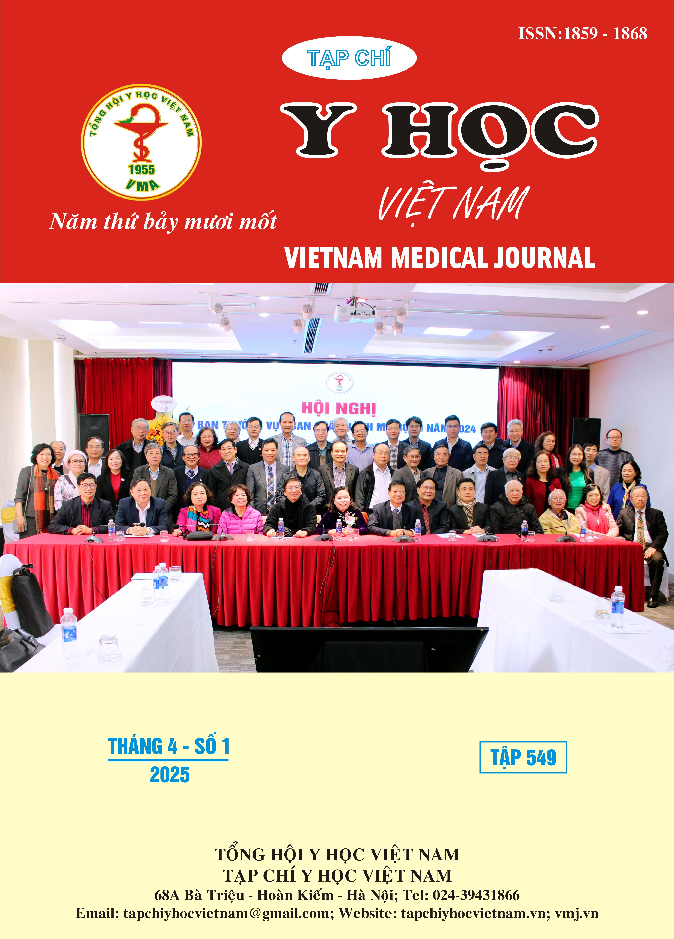SURVEY KNOWLEDGE, ATTITUDES, PRACTICES RELATED TO THE RISK OF CARDIOVASCULAR DISEASE AMONG DYSLIPIDEMIA PATIENTS AT 108 MILITARY CENTRAL HOSPITAL
Main Article Content
Abstract
Objective: Survey of knowledge, attitudes, and practices related to the risk of cardiovascular disease (CVD) among dyslipidemia patients at the 108 Military Central Hospital. Subjects and methods: Cross-sectional descriptive study on 92 dyslipidemia patients from May 2024 to October 2024 interviewed using the questionnaire of Mohammad (2018). Results: Knowledge: good 33.7%, average 21.7%, poor 44.6%. Attitude: positive 48.9%, negative 51.1%. Practice: good 30.4%, average 38.0%, poor 31.6%. There is a positive correlation between the average score of knowledge, attitude, and practice (p<0.05). Knowledge score increased proportionally with attitude score (r = 0.623; p = 0.000), knowledge and practice (r = 0.527; p = 0.000), attitude and practice (r = 0.811; p = 0.000). Conclusion: Dyslipidemia patients have low knowledge, attitude and practice related to CVD risk. There is a positive correlation between knowledge, attitude and practice. Therefore, it is necessary to raise awareness, provide health education and counseling for dyslipidemia patients to see the importance and dangers of CVD, help them have good knowledge, thereby forming positive attitudes and healthy practices, delaying the onset of CVD.
Article Details
Keywords
knowledge, attitude, practice, cardiovascular disease, dyslipidemia
References
2. Lorber D. Importance of cardiovascular disease risk management in patients with type 2 diabetes mellitus. Diabetes Metab Syndr Obes.2014; 7:169-183.
3. Zhao D, Liu J, Wang M et al. Epidemiology of cardiovascular disease in China: current features and implications. Nat Rev Cardiol. 2019;16(4):2 03-212
4. Vaidya A, Aryal UR, Krettek A. Cardiovascular health knowledge, attitude and practice/behaviour in an urbanising community of Nepal: a population-based cross-sectional study from Jhaukhel-Duwakot Health Demographic Surveillance Site. BMJ Open. 2013; 3(10): p. e002976.
5. Mohammad NB, Rahman NAA, Haque M. Knowledge, Attitude, and Practice Regarding the Risk of Cardiovascular Diseases in Patients Attending Outpatient Clinic in Kuantan, Malaysia. J Pharm Bioallied SciJan. 2018; 10(1): 7-14.
6. Cholesterol Treatment Trialists’ (CTT) Collaboration, Baigent C, Blackwell L, et al. Efficacy and safety of more intensive lowering of LDL cholesterol: a meta-analysis of data from 170,000 participants in 26 randomised trials. Lancet. 2010;376 (9753): 1670-1681.
7. Goldman RE, Parker DR, Eaton CB et al. Patients' perceptions of cholesterol, cardiovascular disease risk, and risk communication strategies [published correction appears in Ann Fam Med. 2006 Jul-Aug;4(4):371]. Ann Fam Med. 2006; 4(3): 205-212.
8. Khan SS, Ning H, Wilkins JT et al. Association of Body Mass Index With Lifetime Risk of Cardiovascular Disease and Compression of Morbidity. JAMA Cardiol. 2018; 3(4): 280-287.
9. Gallucci G, Tartarone A, Lerose R et al. Cardiovascular risk of smoking and benefits of smoking cessation. J Thorac Dis. 2020; 12(7): 3866-3876.
10. Smart NA, Downes D et al. The Effect of Exercise Training on Blood Lipids: A Systematic Review and Meta-analysis. Sports Med. 2024.


